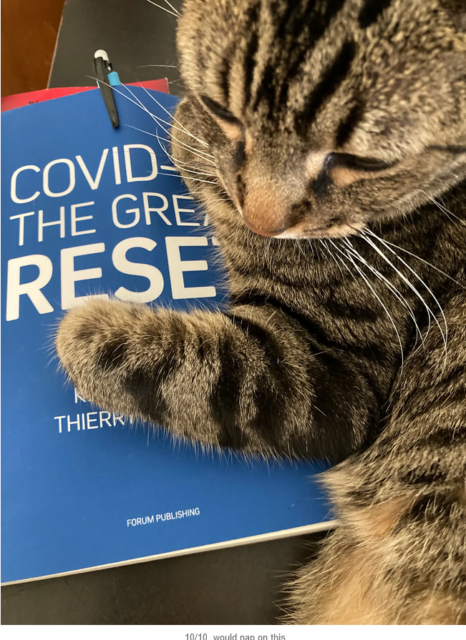Chris Bray somehow manages to girds his loins to take on a task that most of us would run screaming from: actuall reading a book by Klaus Schwab:
Seeing roughly 4,000 references a day to Klaus Schwab and the World Economic Forum, it occurred to me late last week that I’d never gone to the source — I’ve never read a book by Klaus Schwab. So I set out to read the one the Dutch parliamentarian asked his prime minister about, the one about the Great Reset, which Schwab co-wrote with Thierry Malleret. It’s a little like saying, “Man, you know, I’ve never gone swimming in the sewer,” and then pulling on your swimsuit.
So.
First, if you weigh about ten pounds, I can report that the book is the perfect size and shape for lounging.
This is the only value the book provides to the world, and I recommend the immediate deployment of all remaining copies to the one population that can actually use them. Personal to Klaus Schwab: Give the next book a scratchy cardboard cover. Just trust me on this.
As for the book’s relationship to humans: Klaus Schwab, it turns out, is Supervillain Thomas Friedman. Being shrewd, he notices things: Did you know that a lot more people are online now than twenty years ago? Did you know that many objects are now connected to the Internet, from “electric grids and water pumps, to kitchen ovens and agricultural irrigation systems”, and that objects didn’t used to be connected to the Internet? Did you realize that this shift is causing change? When we talk about the pace of change, reader, we are talking about a term called velocity, and a lot of change happening quickly has a high velocity.
If you’ve ever worked for a corporate middle manager who held meetings to encourage the team to think outside the box, you’ve already read Klaus Schwab. We get an endless stream of tautological management-speak, encouraging leaders to embrace transformation by adopting a transformational approach, leading to transformational action and transformational policy caused by a transformational something or other. Page 63: “Innovation in production, distribution, and business models can generate efficiency gains and new or better products that create higher value added, leading to new jobs and economic prosperity.” Innovation can create things that are new, he explained, showing why he’s one of our best-known and most powerful economic experts. A warning to the world: If Kamala Harris and Klaus Schwab ever end up alone in a room together for a sustained and direct conversation, the banality will attain critical mass, and we will all die in a world-consuming implosion.
And here’s the key to the man’s power and status: He sounds like them. He talks to the governing class in language they recognize, telling them the things they already think. He went to a place where people already were, and he told them he led them there.




